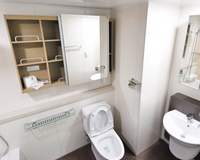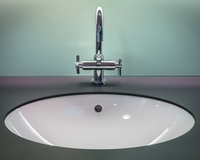Menstrual care solutions for public restrooms are essential for creating spaces where everyone feels supported and respected. Whether you run a café, manage an office building, or oversee a large public facility, addressing menstrual needs is a practical decision that shapes how people experience your space.
This guide explains why investing in menstrual care solutions matters, what challenges facilities commonly encounter, and how you can provide safe, accessible, and inclusive options for every visitor.
Understanding the Current State of Menstrual Care in Public Restrooms
Across many organizations, public restroom amenities for menstruation have not kept pace with user needs. When someone needs a pad or tampon and can’t find one, it can quickly lead to embarrassment, discomfort, or even a shortened visit. Restrooms often lack free or accessible menstrual products, and disposal can be inconvenient or unhygienic. While some places still use coin-operated dispensers, these machines sometimes run empty for weeks or get left in disrepair.
This gap in services directly impacts the experience of visitors. People who menstruate may feel they cannot fully rely on your facilities. The result affects both customer satisfaction and the overall perception of your business. Providing menstrual care makes your space more welcoming and demonstrates a genuine commitment to meeting the real-life needs of your guests.
From an equality perspective, inadequate menstrual care options can create unnecessary barriers. When someone can’t find a product they need, the consequences extend to lost productivity, missed opportunities, and even health concerns. Addressing this gap in care is a step toward treating all visitors with fairness and respect.
Legal and Ethical Considerations for Providing Menstrual Products
On the legal side, several US states and municipalities have begun requiring public venues to offer basic menstrual products for free. Universities, government buildings, and even some workplaces face new expectations around menstrual care. Staying up to date with regional regulations helps you avoid fines or unexpected compliance issues.
Ethically, providing menstrual care solutions in public restrooms aligns with the values of inclusion and social responsibility. It sends a message that your facility supports everyone who enters. Besides meeting a basic health requirement, this act positions your organization as a leader in equity and accessibility.
From a business perspective, investing in inclusive restroom amenities encourages customer loyalty. Research shows that people remember positive restroom experiences, and those details matter when they’re deciding where to spend their time and money. Businesses that offer comprehensive amenities stand out and receive positive reviews.

Menstrual Product Options
Offering the right products is the foundation of an effective menstrual care strategy.
Pads
Standard pads are a universal starting point. They’re easy to use and suitable for most restroom users. Stocking several absorbency levels increases comfort and helps users feel supported throughout the day.
Tampons
Tampons are a popular choice as well. Some users might expect both regular and “super” absorbency levels, so it’s wise to supply several options.
Sustainable and Eco-Friendly Options
The rise of eco-friendly menstrual products has transformed expectations. Many people now prefer organic cotton pads and tampons. Compostable wrappers and sustainable packaging reduce environmental impact, too. By including sustainable and eco-conscious options, you signal that your business values both people and the planet.
Menstrual Product Dispensers
How you provide products matters just as much as what you offer.
Free vs. Coin-Operated Dispensers
Coin-operated dispensers have long been standard, but they come with drawbacks. Users often lack spare change, and machines frequently jam or run empty. Free dispensers remove barriers and show genuine care for restroom visitors. Plus, they reduce embarrassment and encourage proper use of available products.
Dispenser Placement and ADA Accessibility
Placement matters. Install dispensers where they’re clearly visible and easy to reach for all bathroom users. Follow ADA guidelines by positioning them at accessible heights. Make sure signage indicates what products users can expect as well as instructions on how to use the dispenser. User-friendly placement ensures nobody feels awkward or inconvenienced trying to get what they need.
Strategies for Supporting Menstrual Hygiene and Cleanliness in Public Restrooms
Post Signage Instructing Proper Disposal
Clear signage can solve a lot of problems. Place easy-to-read instructions about using tampon disposal bins for menstrual products instead of flushing them down the toilet. Use friendly, direct language and simple graphics to reduce confusion for all restroom visitors.
Consider Touchless Disposal Bins
Standard bins work, but touchless disposal bins take restroom hygiene to the next level. These bins control odors and minimize contact, which visitors will appreciate. Make sure there’s a bin in every stall to ensure convenience and proper disposal.
Provide Individual Menstrual Product Disposal Bags
Offering small, disposable bags for used products is a thoughtful detail. Bags keep disposal discreet and reduce mess, which makes cleaning easier and helps maintain a hygienic restroom.
Prioritize Regular Restroom Cleaning Protocols
The best dispensers, bins, and supplies still need regular maintenance. Set up a clear schedule for cleaning, restocking, and emptying menstrual disposal bins. Frequent checks ensure supplies never run out, and customers always have a positive experience.

A Cost-Benefit Analysis of Implementing Menstrual Care Solutions
Costs
Implementing menstrual care solutions requires some upfront investment. Expenses include purchasing dispensers, initial stock of products, disposal bins, and signage. Ongoing costs cover restocking supplies and maintaining equipment. Regular cleaning and timely emptying of bins are also essential to keep up with hygiene standards.
Benefits
Facility managers may wonder if these costs will pay off. The answer is yes. Providing menstrual care solutions prevents expensive plumbing repairs caused by improper disposal. It also elevates a facility’s image, signaling attention to comfort, hygiene, and inclusivity.
Restrooms equipped with menstrual products can reduce the number of work orders related to clogs and plumbing emergencies. Visitors will notice the extra level of thoughtfulness and are far more likely to return or recommend your business. There’s even a positive impact for the environment if you offer sustainable or reusable products and make it easy for customers to dispose of used items properly.
Addressing Common Concerns and Objections
Some facility managers worry about product misuse, theft, or increased cleanup. However, research and real-world examples show that most people use these products as intended. Product loss tends to be minimal, especially in locations where the offering is normalized and stocked regularly. After all, menstrual care solutions are simply another element of public health hygiene, just like hand soap or toilet paper.
Setting a New Standard for Public Restroom Care
Improving menstrual care solutions for public restrooms is about more than just products and dispensers. It’s a practical investment in health, comfort, and customer satisfaction. Businesses that step up to address menstrual needs send a clear message of respect and inclusivity, positioning themselves as leaders in both service and social responsibility.
If you’re in need of commercial menstrual care solutions, Choice Builder Solutions can help. Our wide product selection can suit any budget or facility need. Contact us today to learn more.





